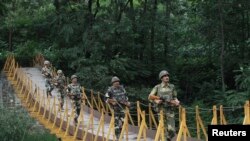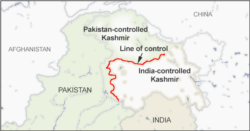Updated at 5:03 p.m. Aug. 3.
Pakistan on Saturday accused rival India of breaching international humanitarian laws by using "cluster munitions" in the latest cross-border skirmishes in Kashmir, saying the weapons killed at least two civilians and injured 11 others on the Pakistani side of the divided region.
The allegations came a day after India again rejected U.S. President Donald Trump's offer to mediate the Kashmir dispute between the two nuclear-armed countries.
A statement by Pakistan's military said the civilian casualties occurred July 31 in the scenic Neelum Valley near the Line of Control (LoC), the de facto border separating Pakistani and Indian portions of the disputed Himalayan territory.
It alleged the Indian army used cluster ammunitions delivered by artillery in the valley, deliberately targeting the civilian population.
Cluster munitions are weapons consisting of a container that opens in the air and scatters many explosive submunitions over a wide area. The related global convention adopted in 2008 prohibits the use of cluster munitions.
India's denial
The Indian army rejected Pakistan’s accusations, saying, "Allegations of the firing of cluster bombs by India are yet another Pakistan lie, deceit and deception."
An army statement said the Pakistani army "regularly attempts to push terrorists through infiltration and opens up with a multitude of weapons to assist them" and that "such [Indian] responses are only against military targets and infiltrating terrorists who are aided by the Pakistan army."
India accuses Pakistan of not doing enough to curb Islamic militants, which New Delhi says are trained in Pakistani territory and cross the Line of Control into Indian Kashmir.
The Pakistani military statement urged the international community "to take notice of this Indian blatant violation of international laws on use of cluster ammunition targeting innocent citizens."
It also released pictures of victims and the purported weapons it said were used by Indian forces.
An Indian official said at least one of the images released by Pakistan of what it said were bombs used by India was of a mortar shell, not a cluster bomb.
Independent verification was difficult to obtain.
Trump's mediation offer
Speaking together with visiting Pakistani Prime Minister Imran Khan at the White House two weeks ago, Trump said Indian Prime Minister Narendra Modi had recently asked him whether he would like to be a mediator or arbitrator on Kashmir, assertions New Delhi swiftly denied.
Trump reiterated his mediation offer Thursday, however, saying he was willing to mediate but that a decision would be up to Modi and Khan.
"If I can — if they wanted me to, I would certainly intervene," Trump told reporters.
Indian Minister for External Affairs S. Jaishankar said he told U.S. Secretary of State Mike Pompeo on the sidelines of an Asian security forum in Bangkok that any discussion of the disputed Kashmir region would be strictly between India and Pakistan.
New Delhi has long opposed outside attempts to mediate its dispute with Pakistan over Kashmir. Islamabad insists international help is required because of persistent Indian refusals to engage in bilateral talks.
Security alert
Saturday's Pakistani allegations came as thousands of people, mostly visitors, reportedly have started leaving the India-ruled portion of Kashmir since the local government warned of possible militant attacks.
Indian authorities announced Friday that they had found evidence of attacks by militants allegedly backed by Pakistan on a major Hindu pilgrimage in Kashmir. The revelation prompted the regional government to order the pilgrims and tourists to return home.
Regional military tensions have remained high since Feb. 14, when a vehicle-born bomb rammed into an Indian paramilitary convoy in Kashmir, killing 40 security personnel and triggering an aerial dogfight between Indian and Pakistani air force planes. New Delhi blamed Pakistan-based militants for plotting the attack. The subsequent escalation in tensions brought India and Pakistan to the brink of a fourth war before international diplomatic intervention helped defuse the situation.
New Delhi has suspended official talks with Islamabad since Modi came to power in 2014, demanding that Pakistan first stop militants from plotting cross-border attacks.
Separatist violence and the ensuing Indian crackdown are estimated to have killed more than 70,000 people in Indian Kashmir.











